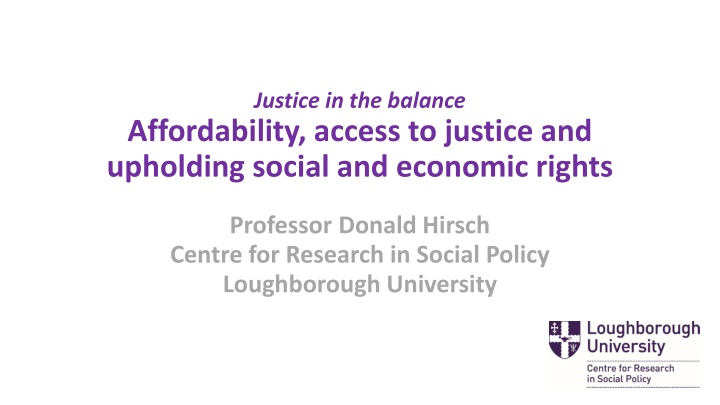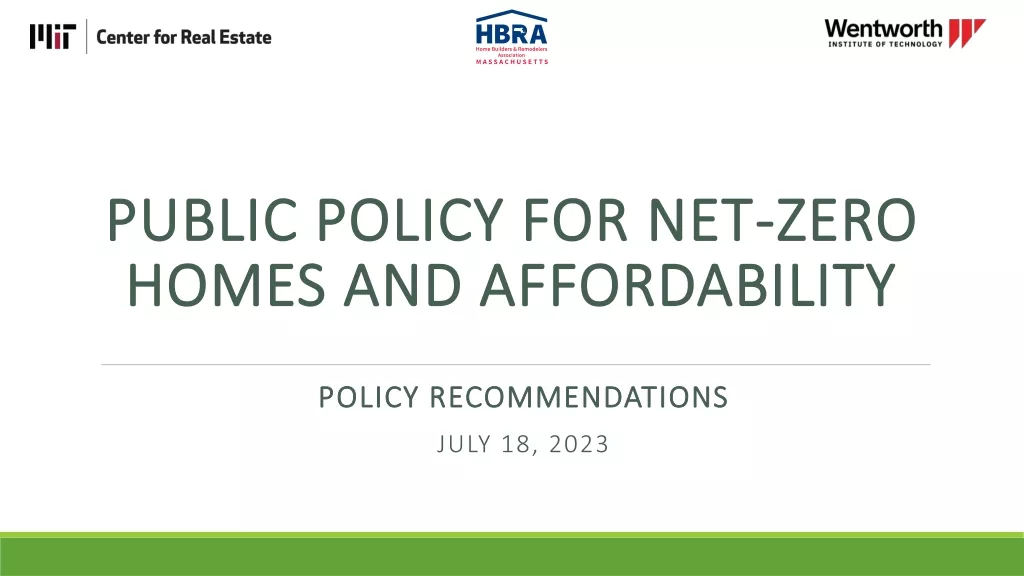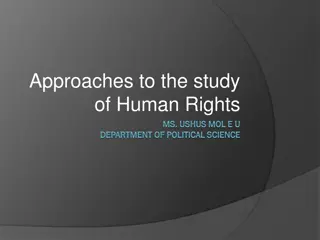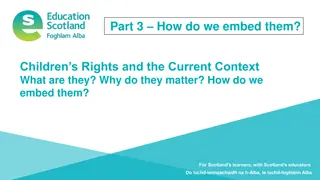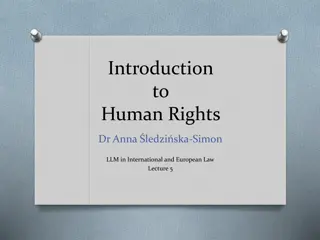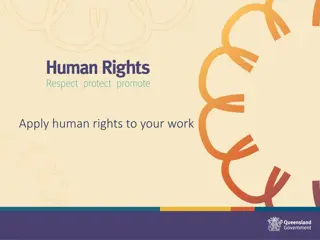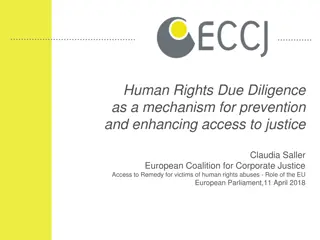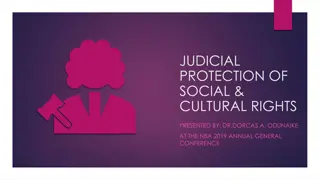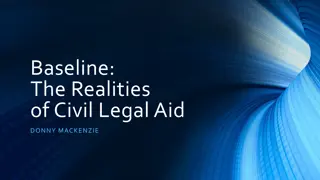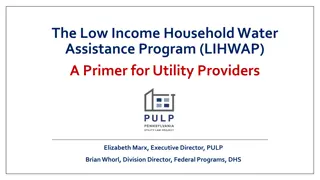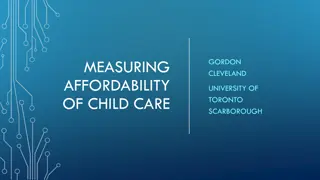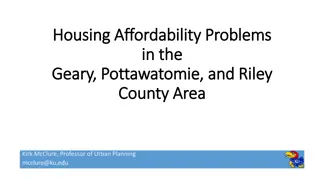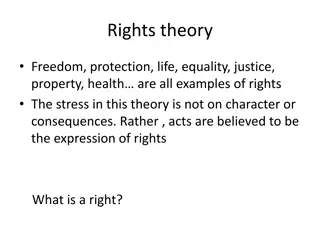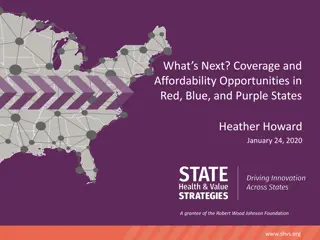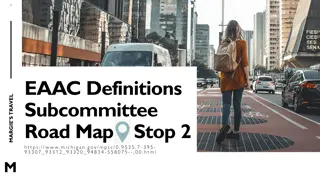Justice in the Balance: Affordability, Access to Justice, and Economic Rights
This content delves into the crucial issues of affordable justice, fair treatment under the law, and upholding minimum living standards. It explores the intersection of economic and social rights, emphasizing the need for a Minimum Income Standard to ensure dignified living. Through insightful analysis and real-world examples, it challenges existing norms and advocates for a more just society.
Download Presentation

Please find below an Image/Link to download the presentation.
The content on the website is provided AS IS for your information and personal use only. It may not be sold, licensed, or shared on other websites without obtaining consent from the author.If you encounter any issues during the download, it is possible that the publisher has removed the file from their server.
You are allowed to download the files provided on this website for personal or commercial use, subject to the condition that they are used lawfully. All files are the property of their respective owners.
The content on the website is provided AS IS for your information and personal use only. It may not be sold, licensed, or shared on other websites without obtaining consent from the author.
E N D
Presentation Transcript
Justice in the balance Affordability, access to justice and upholding social and economic rights Professor Donald Hirsch Centre for Research in Social Policy Loughborough University
Justice and the right to a dignified life Issue 1: affordable justice Do people get access to justice without having to forego the income needed for a dignified living standard? Issue 2: upholding of fair treatment through the law Does the state treat people on low incomes fairly, and if not is there legal redress? Issue 3: upholding minimum living standards Does the state take reasonable steps to ensure access to minimum economic rights, and if not is there legal redress?
Concept of economic and social rights Universal Declaration of Human Rights Article 22: right to social security Article 25 : Everyone has the right to a standard of living adequate for the health and well-being of himself and of his family The problem (up to recently): No evidence-based, generally accepted way of measuring
A Minimum Income Standard for the United Kingdom Produced by Loughborough University for Joseph Rowntree Foundation, annually since 2008 What do people need to meet material needs and participate as part of society? Captures public consensus: based on detailed deliberations by member of the public about minimum household budgets 3 key features: meaning explicit; quantifiable; evidence based
A Minimum Income Standard for the United Kingdom Widespread use: Living Wage; charitable assistance; benchmark in debates about income adequacy Legal precedent: Unison case Tacit acceptance as a benchmark by government: in Unison, Lord Chancellor argued about temporarily foregoing items in budget, implying method legitimate.
Application 1: affordable justice Tribunal fees precedent, Unison Case. Supreme Court 2017 Definition of affordability Where households on low to middle incomes can only afford fees by sacrificing the ordinary and reasonable expenditure required to maintain what would generally be regarded as an acceptable standard of living, the fees cannot be regarded as affordable. ([2017] UKSC 51 para 93)
Application 1: affordable justice Legal aid: are people being denied legal aid when they would need to sacrifice an acceptable living standard in order to cover legal costs? Answer: YES in both civil and criminal legal aid systems Clear evidence in two reports for Law Society (Hirsch, 2018) comparing means test to Minimum Income Standard MOJ review of means test due this autumn.
Application 1: affordable justice Single person, income and eligibility for civil legal aid Step 4: Earning 28k+, typical legal fees can be afforded from income Step 3: Earning from 15k to 28k: no legal aid, but legal costs unaffordable Step 2: Earning up to about 15k: partial contribu- tion required, despite already inadequate income. Much higher for family, eg 70k for lone parent 3 children Legal aid stops when net income still 14% below minimum Step 1: Benefit income only full legal aid Contributions start when net income is below half the minimum needed
Application 1: affordable justice Single person, income and eligibility for civil legal aid Legal costs affordable No legal aid, but legal costs unaffordable Partial contribution imposed, despite inadequate income, JUSTICE GAP affects millions of low to middle earners Full legal aid
Application 2 upholding fair treatment by the state Example a: citizenship fees Is it reasonable to charge 1,012 for a child to be registered as a British citizen? Project for the Registration of Children as British Citizens argue it s unaffordable for a significant number of children, and so unlawfully denies their citizenship rights Charge ruled unlawful by Court of Appeal; Supreme Court judgement pending.
Application 2 upholding fair treatment by the state Example b: right to rehousing where unaffordable rent resulted in homelessness Samuels v Birmingham City Council 2019. Appellant had not been rehoused by council after becoming homeless because of unpaid rent Issue: could she afford rent and still cover essential living costs. Supreme Court ruled that she could not Precedent, based on benefit rates as benchmark, but ambiguity about their adequacy
Application 3 upholding minimum living standards State safety net purportedly upholds subsistence Not the role of law to interpret this But is it being done on a rational basis? Example: Asylum seeker benefit level ruled unlawful by High Court Refugee Action v Home Secretary, 2014, Grounds: not a rational basis for freezing very low benefits and still claiming they cover subsistence needs Future potential: a) benefits objectively leave needs unmet, raising b) the issue of a rational basis for what comprises subsistence .
Conclusion A just legal system must take account of households means Objective standards for doing so have been absent New evidence and new legal precedent open new avenues We need better dialogue between lawyers and social scientists on this d.b.hirsch@lboro.ac.uk
